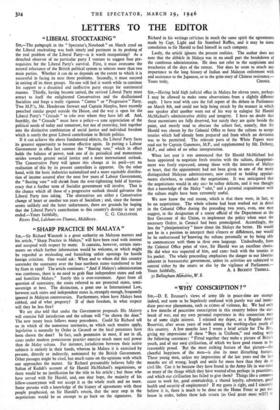SIR,—Having held high judicial office in Malaya for eleven years,
perhaps I may be allowed to make some observations from a slightly different angle. I have read. with care the full report of the debate in Parliament on March 8th, and could not help being struck by the manner in which one speaker after another went out of his way to eulogise Sir Harold McMichael's administrative ability and integrity. I have no doubt that these encomiums are fully deserved, but surely they are quite beside the point, and merely tend to obscure the salient fact, namely, that Sir Harold was chosen by the Colonial Office to force the sultans to accept treaties which had 'already been prepared and from which no deviation was to be permitted. The relevant parts of the White Papers were read out by Captain Gammans, M.P., and supplemented by Mr. Driberg, M.P., and admit of no other interpretation.
When last year it was announced that Sir Harold McMichael had been appointed to negotiate fresh treaties with the sultans, disappoint- ment was freely expressed, among those with the interests of Malaya at heart, that the appointment had not been given to one of the many distinguished Malayan administrators, now retired or holding appoint- ments elsewhere, to conduct the negotiations. It was anticipated that the negotiations would in any cas: be rather delicate, and it was thought that a knowledge of the Malay " adat," and a personal acquaintance with the sultans might have been extremely useful.
We now know the real reason, which is that there were, in fact, to be no negotiations. The whole scheme had been worked out in detail in the Colonial Office during the preceding two years, even, one may suggest, to the designation of a senior official of the Department as the first Governor of the Union, to implement the policy when once the necessary Orders, in Council had been promulgated. Accordingly, the less the " plenipotentiary " knew about the Malays the better. He would not be in a position to interpret their silences or diffidences, nor would he be embarrassed bylmowing the sultans personally or by being able to communicate with them in their own language. Undoubtedly, from the Colonial Office point of view, Sir Harold was an excellent choice. He did what was expected of him, and cam, back with the treaties in his pocket. The whole proceeding emphasises the danger to our liberties inherent in bureaucratic government, unless its activities are subjected to control either by the court; or else by the vigilance of Parliament.—


























 Previous page
Previous page